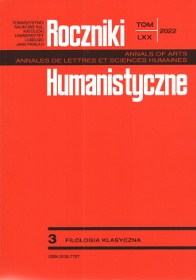Λέγε δή: What We Know about the Ancient Greek Particle δή – the Current State of Research
Λέγε δή: What We Know about the Ancient Greek Particle δή – the Current State of Research
Author(s): Kamila TomakaSubject(s): Language and Literature Studies, Philology
Published by: Towarzystwo Naukowe KUL & Katolicki Uniwersytet Lubelski Jana Pawła II
Keywords: Ancient Greek particles; particle δή; the state of research; the discourse-pragmatic approach
Summary/Abstract: Although research has already established the function of the commonest Greek particles, there is a significant gap in the research on the function of δή in comparison with that carried out on other particles. Assigning a functional significance to this particle is problematic, especially since a satisfactory definition of the function of δή remains, I believe, a desideratum. The usage of the particle δή may appear at first sight to have little significance in Greek texts. This article aims to show that nothing could be further from the truth. The particle δή has had a considerable impact on the discourse. In line with this insight, in this contribution I present the way in which scholars have carried out their investigations into the particle δή. Specific attention is paid to (a) the question of how modern scholars classify this particle, (b) what kind of definition and characteristics they assign to this particle, and (c) what purpose this particle is intended to serve in the discourse according to current research. This paper also provides moot points in the research on the particle δή and ideas for further consideration. The main purpose of this paper is to bring together a summary of the current published information about the particle δή for ready reference for those actively engaged in studying Greek particles.
Journal: Roczniki Humanistyczne
- Issue Year: 70/2022
- Issue No: 3
- Page Range: 27-46
- Page Count: 20
- Language: English

